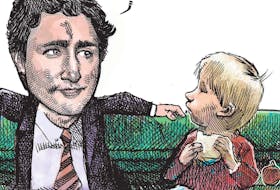This morning as I arrived in Montreal to stand in solidarity against Bill 21, I thought about what this bill meant for Quebecers as a whole, but specifically, what it represented to religious minorities whose religious freedom dwindles as the Quebec government passed legislation Sunday night to restrict any religious symbols.
I imagined if a bill like this were proposed in my home, Alberta, where I have lived my whole life. Would there be a number I call every morning as I get dressed, to give me a stamp of approval on what I’m wearing? To make sure that it’s the Gucci silk scarf I’m wrapping and not any religious-looking material?
I’m not a teacher, but many of my hijabi, Jewish, and Sikh friends are, and it turns out that if they do wear the wrong cloth in Quebec, they can’t get a job. Bill 21 was pushed through, skipping the due process of debate, to ensure that religious symbols are never seen in the field of civil service in Quebec. This forces people to either choose their faith or lose their job. And the kicker: last-minute amendments were made so that a task force can be made to enforce and hand out disciplinary measures if a religious symbol is worn by a public servant.
It is said that we have about 80,000 thoughts a day, and that we repeat about 95 per cent of them. It takes a conscious effort to make sure that we don’t just keep thinking the same old thoughts. As a recent graduate of the University of Alberta, I’m constantly striving towards innovation, creativity and trying to find new solutions to current issues.
It does not help when I am constantly inundated with the same tired discourse about the world I live in — about how my hijab is dangerous and how my clothing choices as a woman need to be policed. I’m sick of government officials in my closet or in the closet of any turban-toting, kippeh – wearing, or pendant-accessorized Canadian.
And yes, Quebec is part of my Canada — the part that taught me about the need for a distinct language, a beautiful culture and about respect for difference. In Montreal, I’m going to be joining Canadians who care about civil liberties to camp out in front of the premier’s office to let the Quebec government know that this over-regulation of our lives is not OK. Otherwise, I’m complicit in destroying an important part, or perhaps the most important part of Canadian life — freedoms and liberties.
If you really want to talk about danger, then consider that our country is being chastised by the United Nations for creating a system of institutionalized discrimination. A lot of people are saying that Bill 21 is an effort to put minorities in their place. It seems to me that we are pretty much doing exactly what we criticize in other countries, perhaps the very same home-countries of those minorities that we love to paternalistically preach to. We are allowing Canada to become a place where we fully endorse second-class citizenship and where equal rights have no meaning.
Bill 21 is therefore an exercise in futility. Would you really be able to tell whether someone was wearing a cap to express their faith or whether they just had chemo last month? It’s absolutely ludicrous. Muslim women wear hijabs in a thousand different ways, from traditional scarves to caps to turbans to festive full-body wraps. Furthermore, who is to say why someone is wearing a symbol? Is someone wearing a cross because they are representing a Jesus-inspired tradition or because their grandmother gave them a special gift before dying. The intention behind any symbol is not something that the government could ever assess.
The whole idea is so bewildering that one can only conclude that Bill 21 sets out to divide us. If that’s the case — then just say it.
Sauleha Farooq is a recent graduate of the University of Alberta, and was a TedX Youth Edmonton speaker.
Copyright Postmedia Network Inc., 2019









